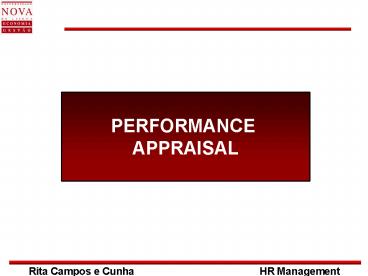PERFORMANCE - PowerPoint PPT Presentation
1 / 19
Title:
PERFORMANCE
Description:
... appraisal and development into a single system. ... Attribute scales. Behavioral scales. Results. Absolute vs relative approach. Rita Campos e Cunha ... – PowerPoint PPT presentation
Number of Views:42
Avg rating:3.0/5.0
Title: PERFORMANCE
1
PERFORMANCE APPRAISAL
2
OBJECTIVES OF PERFORMANCE APPRAISAL/MANAGEMENT
- Strategic
- Link individual job behaviors to strategic
objectives - Development
- Improve performance, motivation and skill
development - Identify individual potential
- Administrative
- Compensation and placement decision
- Evaluate personnel selection and training
effectiveness
3
Performance Appraisal Evaluating an employees
current and/or past performance relative to
his/her performance standards. Performance
Management process that consolidates goal
setting, performance appraisal and development
into a single system. The aim is ensuring that
employees performance is supporting the
companys strategic objectives.
4
VALUE OF PERFORMANCE MANAGEMENT
- TO THE ORGANIZATION
- Assess performance
- Audit skills and talents, for future staffing
decisions - Provide information for compensation decisions
- Determine promotions and layoffs
- Audit potential
5
VALUE OF PERFORMANCE MANAGEMENT
- TO THE INDIVIDUAL
- Provide effort and work recognition
- Establish work objectives for the future
- Discuss future job opportunities within the
company - Establish training and development plans, based
on individual needs - Identify counseling areas
- Opportunity to exchange ideas, objectives,
ideals, anxieties and difficulties
6
VALUE OF PERFORMANCE MANAGEMENT
- TO THE SUPERVISOR
- Improve individual performance through
development of skills and competencies - Assure that subordinates can perform their
jobs - Provide adequate incentives
7
APPRAISAL CRITERIA
- Relevant aspects of performance, on which
appraisal is made. - Single
- Multiple
- Composed
8
EVALUATORS
- Immediate supervisor
- Subordinate
- Colleagues
- Self
- Clients
9
Evaluators frequency of behavior observation
360º FEEDBACK
10
SYSTEMATIC APPRAISAL ERRORS
- Leniency
- Central tendency
- Severity
- Halo
- Recenticity
- Similitude / Contrast
11
REDUCTION OF SYSTEMATIC ERRORS
- Training of evaluators/appraisers
- Commitment from top management
- Required feedback session
- Appraisal of appraising skills
12
APPRAISAL INSTRUMENTS
- Attribute scales
- Behavioral scales
- Results
- Absolute vs relative approach
13
DEVELOPMENT
ADMINISTRATIVE
Information for merit rewards promotions/layoffs
Improve performance
Objective
Comparison basis
Relative
Absolute
Evaluation technique
Results Behavioral scales
Graphic/ attribute scales
Role of supervisor
Counselor/Coach
Judge
14
APPRAISAL INTERVIEW
1 - Preparation Job Description Previous
appraisal Specific examples
2 - Atmosphere Honesty Positive language
Allow appraised to speak
15
APPRAISAL INTERVIEW
3 - Structure Agenda
4 - People you know well Extra time Extra
care with language
16
APPRAISAL INTERVIEW
5 - Bad performance Search for reasons
Search for controllable events
6 - Development and objective definition
7 - Closing
17
FEEDBACK
1 - Focus on specific behaviors 2 - Do not focus
on personality characteristics 3 - Maintain
feedback related with job objectives 4 -
Timely 5 - Assure comprehension 6 - If
negative, assure that behavior is controllable by
appraised 7 - Feedback adapted to the person
18
DEFINING OBJECTIVES
1 - Identify key tasks 2 - Specific and
challenging objectives for each key task 3 -
Specify deadlines for each objective 4 - Allow
subordinate participation 5 - Prioritize 6 - Rank
objectives by importance and difficulty 7 - Build
in mechanisms of intermediate feedback 8 - Create
contingent rewards
19
EFFECTIVE GOALS
S Specific M Measurable A Achievable, but
challenging R Reasonable T Timely































